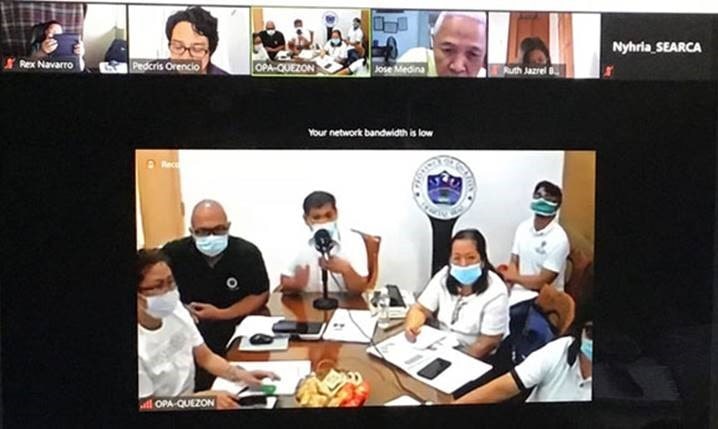The project titled “Piloting and Upscaling Effective Models of Inclusive and Sustainable Agricultural and Rural Development” (ISARD) is set to scale its gains through the application of the project’s implementation model in the province of Quezon. The SEARCA team led by Dr. Pedcris M. Orencio, Program Head for the Research and Thought Leadership Department (RTLD), Dr. Jose R. Medina, former ISARD Overall Program Coordinator, Dr. Rex L. Navarro, Coordinator cum Facilitator, Ms. Carmen Nyhria G. Rogel, Program Specialist, and Ms. Ruth Jazrel M. Bandong, both from RTLD had a virtual meeting with the representatives from the Provincial Local Government Unit (PLGU) Quezon on 27 July 2020 to discuss this possible collaboration.
 SEARCA team with the Office of the Provincial Agriculturist (OPA)-Quezon meet via zoom to conceptualize the scaling activities of the SEARCA ARD Implementation Model.
SEARCA team with the Office of the Provincial Agriculturist (OPA)-Quezon meet via zoom to conceptualize the scaling activities of the SEARCA ARD Implementation Model.
The meeting took off from the presentation of the Office of the Provincial Agriculturist (OPA)-Quezon of the coconut industry development plan with a vision of “A market-driven coconut industry with empowered and resilient farmers engaging in profitable coconut-based enterprises contributing to inclusive and sustainable agricultural development”. The program aims to (1) establish provincial nurseries for high-yielding coconut varieties; (2) replace senile coconut trees with high-yielding varieties; (3) increase coconut productivity through proper cultural management and fertilization; (4) increase farmers’ income through crop diversification and intercropping (coffee, cacao, banana); and (5) improve the economic conditions of coconut farmers through engaging into value-adding activities and enterprise establishment. OPA-Quezon also discussed the agricultural development framework that includes interventions along the whole value chain. As a way forward, they desire to strengthen their collaboration and commitment with the Department of Agriculture (DA), Philippine Coconut Authority (PCA), Non-Government Organizations (NGOs) and other national and international agencies towards the implementation of the Quezon Coconut Industry Development Plan and find additional funding support from other agencies to further support these initiatives.
This was followed by the presentation by Dr. Orencio and Dr. Medina of the pilot project’s highlights, gains, and interventions. SEARCA intends to support the proposed implementation through the ARD model specifically in the areas of (1) value addition to the coconut products; (2) linkages of the farmers to the market; and (3) farmers’ organization in the province. The proposed project will be anchored on components such as technical assistance, capacity building, knowledge management, and linkage and network. Additionally, the ARD model will be customized based on the gaps and needs of the sites and will be translated into development strategies. At the end of the meeting, both parties levelled off their expectations and next steps.
To scale the ARD implementation model, a Guidebook that illustrates the step-by-step process for setting up models of inclusive and sustainable agriculture and rural development in communities will be used. The research outputs, lessons learned, challenges and recommendations from the ISARD pilot project were collated into this guidebook that shall serve as a reference for scaling the project across different crops and various locations locally and internationally and as a guide in the whole process of establishing and implementing effective models of ARD. The Guidebook promotes the sustainability strategy of combining the strengths of the academe as source of experts and technologies (through partner State Universities and Colleges), and the local government units (LGUs) as provider of public goods and extension services.